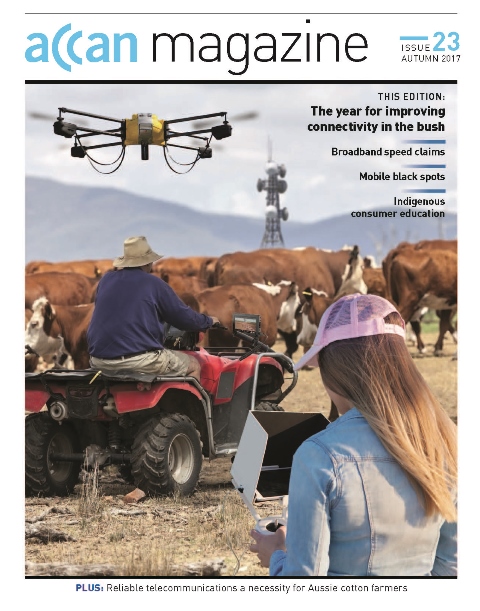- Details
 The cotton industry is an integral part of the Australian economy, worth more than $1.5 billion in export earnings for the 2015-16 season and employing on average 10,000 people.
The cotton industry is an integral part of the Australian economy, worth more than $1.5 billion in export earnings for the 2015-16 season and employing on average 10,000 people.
Cotton Australia, the peak industry body for Australia’s cotton industry, is one of ACCAN’s newest members. The organisation is also a member of the Regional, Rural and Remote Communications Coalition.
As a member of both ACCAN and the Coalition, Cotton Australia has highlighted telecommunications issues many cotton growers experience, including poor to no mobile service, unreliable internet services with speeds and data caps that often mean growers struggle to send an email, let alone capitalise on all the benefits of ‘smart’ agriculture.
Read more: Reliable telecommunications a necessity for Aussie cotton farmers
Write comment (0 Comments)- Details

Download: ![]() ACCAN Magazine Issue 23 Autumn 20173.76 MB(Note: reading order not accessible)
ACCAN Magazine Issue 23 Autumn 20173.76 MB(Note: reading order not accessible)
Download accessible version:![]() ACCAN Magazine Issue 23 Autumn 2017 - accessible version38.93 KB
ACCAN Magazine Issue 23 Autumn 2017 - accessible version38.93 KB
- Details
“We hear you and we want to help” was the majority message from politicians in Canberra this week when they met with the Regional, Rural & Remote Communications Coalition.
The Coalition met with more than 50 members of parliament over two days with the aim of highlighting the plight of telecommunications in the bush.
National Farmers' Federation President, Fiona Simson, said it was heartening that politicians understood the perils of an inability to access affordable and reliable telecommunications however action was what was needed now.
"Actions speak louder than words. Consensus by all politicians that this is a vital issue is yet another validation that now is the time for action towards solving the great #datadrought," Ms Simson said.
Read more: Bush telecoms group tells Canberra it’s time for action
- Details
 March 15 is World Consumer Rights Day (WCRD). WCRD is an opportunity to promote the basic rights of all consumers, demanding that those rights are respected and protected, and a chance to protest against the market abuses and social injustices which undermine those rights.
March 15 is World Consumer Rights Day (WCRD). WCRD is an opportunity to promote the basic rights of all consumers, demanding that those rights are respected and protected, and a chance to protest against the market abuses and social injustices which undermine those rights.
The theme for WCRD 2017 is ‘Building a Digital World Consumers can Trust.’ To tie into this theme, this blog looks at where consumers can turn to when they need to make a complaint, get advice or report scams and cyberbullying.
Read more: Building a Digital World Consumers can Trust
Write comment (0 Comments)- Details
 A recent ACCAN survey of 100 small businesses found that 96 of the respondents had experienced at least one issue with their telecommunications services. With many small businesses relying on these services to operate, this is a concerning figure. When services don’t deliver, this can mean lost profits and productivity for small businesses.
A recent ACCAN survey of 100 small businesses found that 96 of the respondents had experienced at least one issue with their telecommunications services. With many small businesses relying on these services to operate, this is a concerning figure. When services don’t deliver, this can mean lost profits and productivity for small businesses.
The top issues experienced by the respondents were issues with: internet speeds, internet congestion during peak times, costs and outages. The most prevalent issue was slow data speed, with 73 respondents reporting this problem.
Read more: What telco issues are small businesses experiencing?
Write comment (0 Comments)- Details
 This is part three in our series of blogs looking at issues highlighted by ACCAN stakeholders at public hearings for the Productivity Commission’s Inquiry on the Universal Service Obligation (USO).
This is part three in our series of blogs looking at issues highlighted by ACCAN stakeholders at public hearings for the Productivity Commission’s Inquiry on the Universal Service Obligation (USO).
This post looks at affordability concerns highlighted by the South Australian Council of Social Service (SACOSS) and issues raised by ACCAN member, Bruce Bebbington, at the public hearing held in Perth.
Read more: Having a say on the USO (part three)
Write comment (0 Comments)- Details
 In late January/early February members of the Regional, Rural and Remote Communications Coalition attended public hearings to voice concerns on the Productivity Commission’s draft inquiry report on the Universal Service Obligation (USO).
In late January/early February members of the Regional, Rural and Remote Communications Coalition attended public hearings to voice concerns on the Productivity Commission’s draft inquiry report on the Universal Service Obligation (USO).
This post covers the hearings attended by Victorian Farmers Federation (VFF), AgForce Queensland and Better Internet for Rural, Regional & Remote Australia (BIRRR).
Read more: Having a say on the USO (part two)
Write comment (0 Comments)- Details
In 2016 ACCAN commenced an annual survey of small business operators to provide an insight into the most prevalent telecommunications issues affecting small business in Australia. The 2016 survey has now closed. We will commence our 2017 survey later this year.
ACCAN will use the survey reports to highlight concerns to the telecommunications services providers and the Telecommunications Industry Ombudsman (TIO) to work toward improved services for Australian small business consumers.
Survey reports
2016 Survey
Download: ![]() Small business survey 2016 report794.86 KB
Small business survey 2016 report794.86 KB
Download: ![]() Small business survey 2016 report1.19 MB
Small business survey 2016 report1.19 MB
- Details
 The first of many issues in 2017 to be a focus for the Regional, Rural and Remote Communications Coalition was the Productivity Commission’s Draft Report for the Inquiry into the Universal Service Obligation (USO).
The first of many issues in 2017 to be a focus for the Regional, Rural and Remote Communications Coalition was the Productivity Commission’s Draft Report for the Inquiry into the Universal Service Obligation (USO).
The USO underpins consumers’ access to phone services, including payphones. While many may have never heard about the USO, it is an important obligation that aims to ensure voice services are available and accessible to all Australians.
Read more: Having a say on the USO (part one)
Write comment (1 Comment)- Details
 The Regional, Rural and Remote Communications Coalition is urging the approximately 1200 households who have not yet switched from the Interim Satellite Service (ISS) to the Sky Muster National Broadband Network (nbn) satellite service to do so as soon as possible.
The Regional, Rural and Remote Communications Coalition is urging the approximately 1200 households who have not yet switched from the Interim Satellite Service (ISS) to the Sky Muster National Broadband Network (nbn) satellite service to do so as soon as possible.
"These households need to switch before 28 February or they will be left without an internet service. They should contact their preferred provider as soon as practicable to arrange a new service," NFF President Fiona Simson said.
Write comment (0 Comments)- Details
 This week a Federal Parliamentary Committee is expected to report on a draft bill to amend the Competition and Consumer Act telco specific provisions. In this blog we will outline our assessment of the impact on consumers. This is the approach we took in our response to the Department of Communications and the Arts consultation on the proposed changes in October 2016.
This week a Federal Parliamentary Committee is expected to report on a draft bill to amend the Competition and Consumer Act telco specific provisions. In this blog we will outline our assessment of the impact on consumers. This is the approach we took in our response to the Department of Communications and the Arts consultation on the proposed changes in October 2016.
Not surprisingly, Telstra is generally supportive of the removal of the telco specific rules. However, other telecommunications industry providers are taking a different approach as they believe the removal of the specific rules would weaken competition in the telco sector.
Read more: Our take on the telco specific competition law reforms
Write comment (0 Comments)- Details
ACCAN has recently made a submission to the Department of Prime Minister and Cabinet’s ICT Procurement Taskforce consultation. The Taskforce is investigating how the Government’s procurement of information and communications technologies can be improved. ACCAN made two recommendations to the Taskforce to ensure that all government information, services and employment opportunities are accessible to people with disability.
